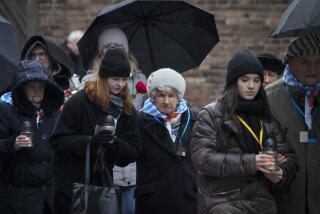Polish military urges caution in search of rumored Nazi gold train site
Polish military experts planning to examine the site where a Nazi “gold train” may have gone missing during World War II have urged authorities to first clear the thickly forested area in case it contains booby traps or volatile weapons.
New theories that the train may contain dangerous cargo have surfaced in recent days as the wooded foothills of the Owl Mountains have become the center of fevered attention for history buffs, treasure hunters and tourism promoters.
Authorities in the Lower Silesia region have warned from the outset of the purported discovery of the legendary treasure train that if it does exist, it may have been fixed with explosives or mounted guns to protect its cargo.
The British tabloid newspaper Daily Mail added to the fears of what might be discovered in the excavation when it published an article Tuesday quoting unidentified sources familiar with the recent find as speculating that the train might have been carrying the bodies of slave laborers who died building a network of tunnels for the Nazis during World War II.
Two treasure hunters set off an international frenzy in mid-August when they reported to authorities in the Lower Silesian castle town of Walbrzych that they had located a more than 300-foot-long train buried in a tunnel near the rail line that leads from the regional capital, Wroclaw.
Piotr Koper, a Pole and history enthusiast from Walbrzych, and Andreas Richter from Germany offered to lead authorities to the buried train in exchange for 10% of the value of its cargo.
Polish law stipulates that any valuables found on national territory belong to the state, TheNews website reported Tuesday. But national officials have apparently signed off on the requested finders’ fee as an army demining team has been examining a wooded area near Walbrzych, local media have been reporting since Friday.
Lt. Col. Artur Golawski, spokesman for the army operations command, told the Associated Press on Tuesday that the initial investigation of the suspected train site found fallen trees that needed to be removed before the soldiers could complete a thorough inspection and assessment of any dangerous materials that might be buried there.
Lower Silesia was part of Germany before the Nazi defeat in 1945 and Wroclaw, then known as Breslau, was an important military staging area for the Third Reich until Soviet Red Army forces began advancing on the Germans in the last months of the war.
The Nazis built a network of tunnels, bunkers and underground warehouses in what was known as Project Riese, the German word for giant. Some of the sprawling subterranean labyrinth was explored by Poland’s postwar communist government but many of the potential hiding places for the rumored treasure train have been considered inaccessible for decades because of cave-ins, suspected mines or feared accumulation of hazardous gases.
Legend circulating in Lower Silesia since the war’s closing days holds that the Nazis loaded a military train with looted gold, artworks and jewelry to evacuate it from the area and keep it from falling into the hands of the approaching Soviet forces.
Poland’s deputy culture minister, Piotr Zuchowski, told journalists at a Warsaw news conference on Aug. 31, before Koper and Richter came forward, that he was “more than 99% certain” that the train exists. He said the finders had been tipped off to the location by a man who helped hide the train 70 years ago.
The culture official’s enthusiastic account of the reported train discovery has inspired an invasion of treasure and curiosity seekers, as well as enterprising new attractions by tourism purveyors.
The Ksiaz Castle museum guides have laid on new tours of the underground tunnels that honeycomb the ground beneath the hilltop fortress and the Old Mine Science and Art Center is promoting special souvenirs and T-shirts celebrating “Explore Walbrzych” excursions, TheNews website reported.
Follow @cjwilliamslat for the latest international news 24/7
More to Read
Start your day right
Sign up for Essential California for news, features and recommendations from the L.A. Times and beyond in your inbox six days a week.
You may occasionally receive promotional content from the Los Angeles Times.






